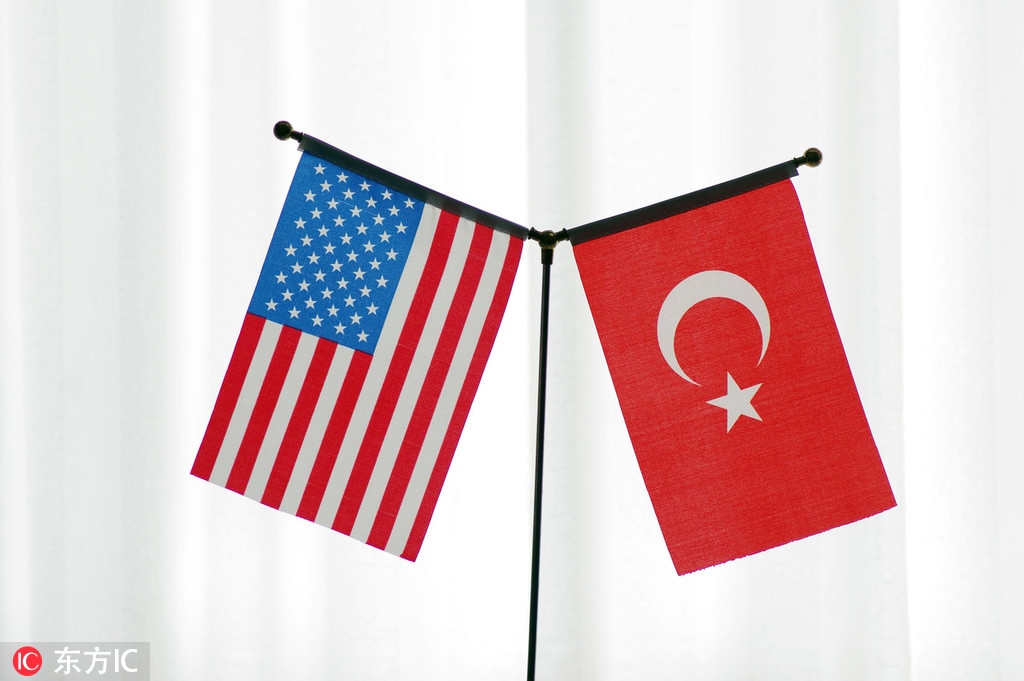Erdogan invites Trump to meeting


Leaders agree on talks as US pulls out of Syria and Turkey sends troops to border
Turkish President Recep Tayyip Erdogan has invited US President Donald Trump to visit Turkey in 2019. At the same time, Erdogan has sent more troops to Syria's border ahead of an imminent US withdrawal, a series of moves experts said target Kurdish forces.
White House spokesman Hogan Gidley said in a statement on Monday that Trump is "open to a potential meeting in the future", although "nothing definite is being planned".
Turkey and the US agreed on Tuesday to complete an agreement for the withdrawal of the Syrian Kurdish People's Protection Units (YPG) militia from the northeast Syrian town of Manbij before the full US withdrawal from Syria, the state-owned Anadolu news agency cited Turkish Foreign Minister Mevlut Cavusoglu as saying.
Erdogan, unlike most other US allies, welcomed Trump's abrupt decision last week to withdraw troops from Syria, a move that has upended US policy in the region but removes a source of friction between the two countries.
Meanwhile, on Monday, Ankara sent more troops to its Syrian border and said an offensive targeting the YPG militia and the Islamic State group will be launched in the coming months.
Zhang Fan, a researcher at the Chinese Academy of Social Sciences, said the Kurdish issue has always been a major concern for Turkey, which is the key reason behind the latest moves.
Ankara and Washington are allies in the North Atlantic Treaty Organization, but Zhang said the two countries have differed on the Kurdish issue.
Turkey views the YPG as a "terrorist offshoot" of the outlawed Kurdistan Workers' Party (PKK), which has waged an insurgency against the Turkish state since 1984. But the militia has been instrumental in working with US forces on the ground in the fight against the IS group in Syria.
"Just as we did not leave our Syrian Arabs to Daesh (IS), we will not leave Syrian Kurds to the cruelty of the PKK," Erdogan said during a speech in Ankara.
Trump and Erdogan agreed during a phone call on Sunday to coordinate to prevent a power vacuum from developing as the US prepares to leave Syria.
However, Zhang said, the US may abandon the Kurds at any crucial moment, which the country has done before, as it is not a top US priority in the Middle East. But the withdrawal will be a heavy blow to the Kurds.
Zhang also said that the US withdrawal, while leaving some maneuvering space for Turkey, will not make Turkey a top power in Syria.
"Stretching across Asia and Europe, Turkey has a very special geopolitical position, but doesn't play a decisive role in Middle East issues," he said. "Iran and Russia, on the other hand, will be in the key positions."
Turkish Foreign Minister Cavusoglu will travel to Russia to discuss the process of US withdrawal in the coming days, according to a report from CNN.
Ilham Ahmed, a Syrian Kurdish official, said the Kurdish-led forces are now reaching out for potential new allies, underscoring the dire situation the group now finds itself in, according to The Associated Press.
"We will deal with whoever can protect the … stability of this country," said Ahmed.
Ahmed said her forces are talking with the Russia, the Syrian government and a few European countries on issues concerning the US withdrawal.
Erdogan's spokesman Ibrahim Kalin said on Monday that a US military delegation would arrive this week to "discuss how to coordinate (the withdrawal) with their counterparts".
A Turkish foreign ministry delegation will also go to Washington for talks in early January, he added.
Reuters and AFP contributed to this story.
































